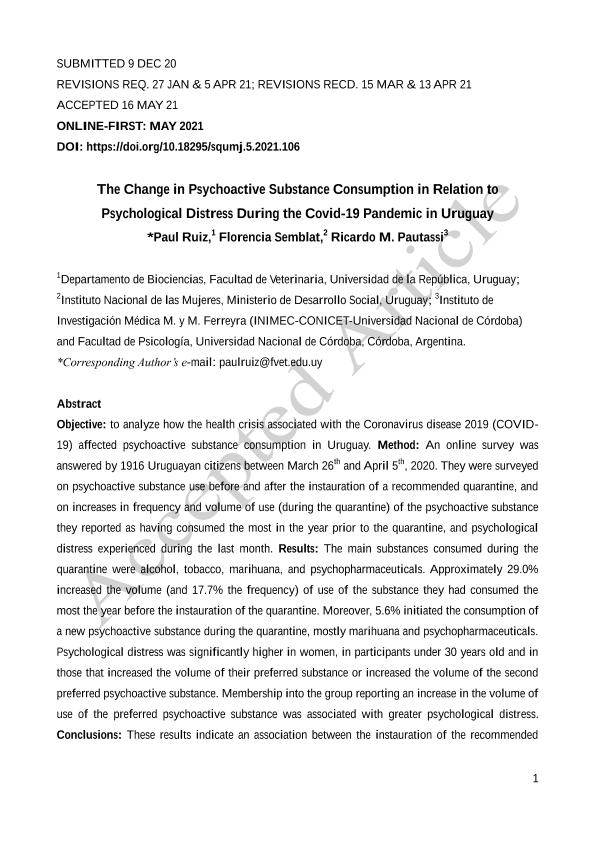Mostrar el registro sencillo del ítem
dc.contributor.author
Ruiz, Paul

dc.contributor.author
Semblat, Florencia
dc.contributor.author
Pautassi, Ricardo Marcos

dc.date.available
2021-07-07T18:51:31Z
dc.date.issued
2021-05
dc.identifier.citation
Ruiz, Paul; Semblat, Florencia; Pautassi, Ricardo Marcos; The Change in Psychoactive Substance Consumption in Relation to Psychological Stress During the Covid-19 Pandemic in Uruguay; Sultan Qaboos University; Sultan Qaboos University Medical Journal; 2021; 1; 5-2021; 1-16
dc.identifier.issn
2075-051X
dc.identifier.uri
http://hdl.handle.net/11336/135684
dc.description.abstract
Objective: to analyze how the health crisis associated with the Coronavirus disease 2019 (COVID-19) affected psychoactive substance consumption in Uruguay. Method: An online survey was answered by 1916 Uruguayan citizens between March 26th and April 5th, 2020. They were surveyed on psychoactive substance use before and after the instauration of a recommended quarantine, and on increases in frequency and volume of use (during the quarantine) of the psychoactive substance they reported as having consumed the most in the year prior to the quarantine, and psychological distress experienced during the last month. Results: The main substances consumed during the quarantine were alcohol, tobacco, marihuana, and psychopharmaceuticals. Approximately 29.0% increased the volume (and 17.7% the frequency) of use of the substance they had consumed the most the year before the instauration of the quarantine. Moreover, 5.6% initiated the consumption of a new psychoactive substance during the quarantine, mostly marihuana and psychopharmaceuticals. Psychological distress was significantly higher in women, in participants under 30 years old and in those that increased the volume of their preferred substance or increased the volume of the second preferred psychoactive substance. Membership into the group reporting an increase in the volume of use of the preferred psychoactive substance was associated with greater psychological distress. Conclusions: These results indicate an association between the instauration of the recommended quarantine in Uruguay and greater psychoactive substance use during the period, as well as an association between increased psychoactive substance use during this period and levels of psychological stress. These results are relevant in terms of public health and public policies.
dc.format
application/pdf
dc.language.iso
eng
dc.publisher
Sultan Qaboos University
dc.rights
info:eu-repo/semantics/openAccess
dc.rights.uri
https://creativecommons.org/licenses/by-nd/2.5/ar/
dc.subject
PANDEMIC
dc.subject
URUGUAY
dc.subject
PSICOACTIVE SUBSTANCES
dc.subject
COVID-19
dc.subject.classification
Otras Ciencias de la Salud

dc.subject.classification
Ciencias de la Salud

dc.subject.classification
CIENCIAS MÉDICAS Y DE LA SALUD

dc.title
The Change in Psychoactive Substance Consumption in Relation to Psychological Stress During the Covid-19 Pandemic in Uruguay
dc.type
info:eu-repo/semantics/article
dc.type
info:ar-repo/semantics/artículo
dc.type
info:eu-repo/semantics/publishedVersion
dc.date.updated
2021-07-07T15:15:08Z
dc.identifier.eissn
2075-0528
dc.journal.volume
2021
dc.journal.number
1
dc.journal.pagination
1-16
dc.journal.pais
Omán

dc.description.fil
Fil: Ruiz, Paul. Universidad de la República; Uruguay
dc.description.fil
Fil: Semblat, Florencia. Instituto Nacional de las Mujeres; Uruguay
dc.description.fil
Fil: Pautassi, Ricardo Marcos. Consejo Nacional de Investigaciones Científicas y Técnicas. Centro Científico Tecnológico Conicet - Córdoba. Instituto de Investigación Médica Mercedes y Martín Ferreyra. Universidad Nacional de Córdoba. Instituto de Investigación Médica Mercedes y Martín Ferreyra; Argentina
dc.journal.title
Sultan Qaboos University Medical Journal
dc.relation.alternativeid
info:eu-repo/semantics/altIdentifier/url/https://journals.squ.edu.om/index.php/squmj/article/view/4358
dc.relation.alternativeid
info:eu-repo/semantics/altIdentifier/doi/http://dx.doi.org/10.18295/squmj.5.2021.106
Archivos asociados
